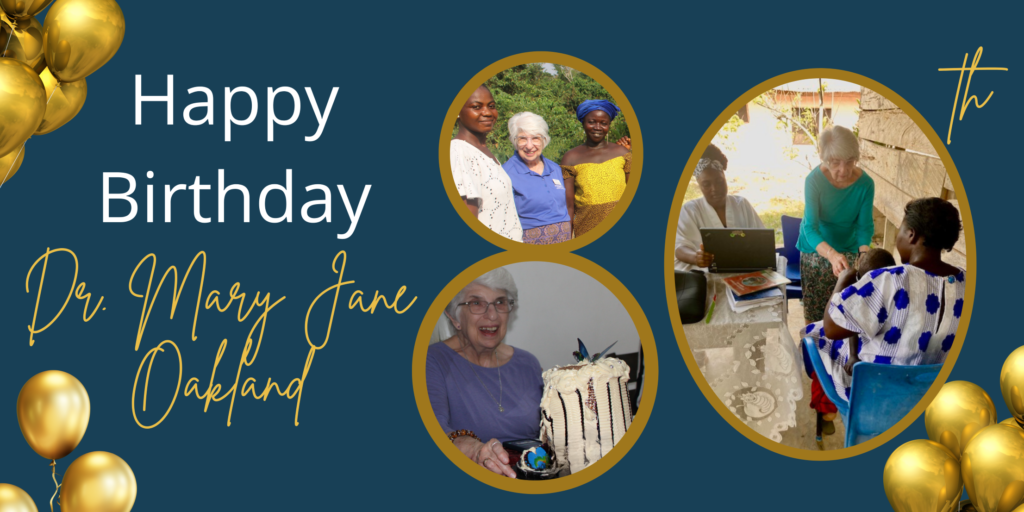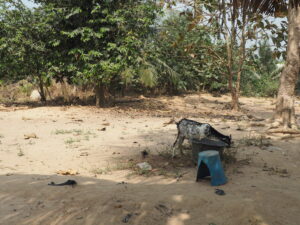Benjamin Kusi, Ghana Country Director, and 20 Years with Self-Help International
Benjamin Kusi, Self-Help International’s Country Director in Ghana, recently celebrated 20 years of working with Self-Help! In order to celebrate this special occasion, we asked him to write about his time working with us and about the evolution of Self-Help’s work in Ghana. We also had a small celebration for him in Ghana during Nora Tobin’s last trip to Ghana couple of weeks ago where Self-Help acknowledged Benjamin for all he’s done for the organization. We’ve shared his thoughts in this blog post, as well as some photos of the gathering in Ghana.
Reflections from 20 Years with Self-Help International
By Benjamin Kusi, Ghana Country Director

Benjamin Kusi, Ghana Country Director
It has been a great life-changing experience working with Self-Help International (SHI). I started at SHI when I was a new graduate in agricultural engineering from Kwame Nkrumah University of Science and Technology (KNUST) in Kumasi, Ghana. In the 20 years since I’ve started, I’ve become a passionate social worker serving poor and marginalized people in rural Ghana.
Philosophy
Since I’ve started, I’ve seen the changes in Self-Help International’s vision.
When I started, the vision was: “Sowing seeds of self-reliance.” Now it is: “Alleviating hunger by helping people help themselves.”
Self-Help frowns on handouts and promotes demand-driven interventions. Potential beneficiaries of any SHI intervention must demonstrate their willingness to help themselves.
SHI believes in the independence of its staff and encourages creative thinking and problem solving when designing and implementing projects. When I first started working for SHI, I spearheaded the design of a staff uniform for easy identification and protection. I also played a key role in adopting the Excel program used for our micro-loans program. The support and encouragement received from the staff in my first year at SHI provided enough motivation to keep me going.
Human Resources
A lot of people have served SHI within the past twenty years, some of whom really left their mark. There have been three Executive Directors: Llewellyn Hille, Merry Fredrick and Nora Tobin and three Country Managers: Forster Boateng, Wilberforce Baffour Ansah, and Benjamin Kusi.
Wilberforce, my predecessor, gave me the needed hands-on training that really made me who I am today. He taught me how to work with limited resources and be frugal with my expenses.
Merry would say to me, “Benjamin, quality and not quantity” and Nora would ask, “Is this the best way to utilize our limited resources?”
There have been dozens of Project Officers who have served on different projects. Currently, there is one Project Coordinator, six Project Officers and one Assistant Project Officer.

SHI’s Ghana staff
Continuous self-development is a common practice at Self-Help. Staff members are encouraged to better themselves to meet the changing demands of our work and the people we serve. In June 2005, SHI supported me to undertake a Master of Arts (MA) in Human Resource Development at the University of Cape Coast. Currently, four out of our twelve staff (Victoria Yamson, Patience Obour, Zakaria Adams and Elizabeth Adu-Opoku) are pursuing their Masters while Nancy Ansah is pursuing her Bachelors.
Interventions/Programs
SHI has worked on more than ten programs since 1999, including the Village Infrastructure Project (1997-2004), Micro-Loans for Rural Women (1999 to date), Food Crops Development Project (2002-2006), Inland Valleys Rice Development Project (2008), Root and Tuber Improvement and Marketing Program (2010-2012), Afram Plains District Agricultural Project (2008-2009), School Feeding Program (2010 to date), Young Adults Training Centre (2013 to date) and Teen Girls Clubs (2016 to date).
The Village Infrastructure Project (VIP), Food Crops Development Project (FCDP), Root and Tuber Improvement and Marketing Projects (RTIMP) and Afram Plains District Agriculture Development Project (APDAP) were all interventions of the government of Ghana that SHI helped with the implementation. I was the coordinator for the FCDP, RTIMP and APDAP. These engagements supported SHI by generating revenue locally to support some of SHI’s operations in the country.
It was a privilege to serve on these programs that have transformed the lives of many Ghanaians, including women and children. In 2004, when I took over the micro-credit program, it served 90 women with GHC 11,550 ($12,833.33 USD) in loan disbursements. In 2012, when I was appointed interim Country Director for SHI, I handed the program over to another staff member At that time, there were 425 women participants and GHC 142,244.40 ($74,865.47 USD) in loan disbursements.
Before 1999, SHI was into vigorous promotion of intermediate transport technologies, which included power tillers, donkey carts and bicycles, to address the drudgery associated with carting farm produce to market centers. The micro-credit program, which started in May 1999 and is now our largest program, was an “experiment” to address inadequate access to loans by farmers, especially women.
As a trained engineer, I was enthusiastic about fixing machines when I first joined SHI. But through my engagement with the women and children who live in scattered rural communities, my passion to serve humankind has increased, especially in meeting with people so we can identify and solve problems together.
Beneficiaries
There are currently 1,755 people benefiting from our interventions: 700 participants in micro-credit; 722 in the School Feeding Program, 140 in the Teen Girls Clubs, 113 in the nutrition program, 80 in the Young Adults Training Center. More than 10,000 people have benefited directly or indirectly from our interventions since 1999.
There are now qualified and trained teachers and nurses because of the help of micro-loans given to their parents years ago. One of them who readily comes to mind is Mavis Berko, a nurse at the Suntreso Government Hospital in Kumasi and a daughter of Felicia Berko of Afari, who made her daughter’s education possible through her participation in the micro-credit program.
Leadership style

Benjamin holding his plaque honoring 20 years, with his wife and SHI board member, Rev. Dr. Mary Jane Oakland
SHI has taught people, including me, to be humble, efficient, frugal and have a can-do spirit. I dislike it when people say “it’s impossible” when they haven’t even tried. Even if available information suggests that it won’t work, it helps to give it a try. I believe in teamwork: winning together and losing together. I’ve learned to never point an accusing finger in the midst of challenges because it dampens spirits.
At the beginning of each year, the SHI team members present their proposed activities and we sit, discuss, agree and implement together. People are assessed based on their achievements. I’ll always reward hard work publicly and criticize in silence.
I’m always motivated to give more to those who achieve more with few resources.
Financial Resources
Our life-changing stories and implementation strategies, which are well-grounded in community participation, have resonated well with many donors who have generously donated to support our programs all these years and we are forever grateful to them. There’s been steady and consistent growth in terms of our programs and budgets, with 2017 and 2018 being phenomenal years for SHI.
Though SHI has been in Ghana for more than a quarter century, we’ve largely remained in Ashanti region, the most populous among Ghana’s ten regions. Spreading ourselves thinly across districts and regions of the country is not in sync with our resource utilization strategies. Every life counts and, so long as there is work to do, it must be done.
Collaborators
The Ministry of Food and Agriculture has been our number one collaborator and we’ve enjoyed effective collaboration with them over the years. Our offices have always remained on their premises, and in the past we enjoyed a bit of support in terms of electricity and water supply. SHI has also supported the Farmer’s Day celebration every year by donating to the farmers’ awards. Health education has been key in the services we provide our clients and, in line with this, we’ve worked with the Ministry of Health at the district level and private health organizations such Women’s Health to Wealth and Marie Stopes International.
Useful lessons
It’s motivating to work with the poor and marginalized, especially women and children. It’s not difficult to have an impact on their lives and they’re grateful for even the smallest opportunity.

Benjamin with his wife and SHI Executive Director, Nora Tobin
Many believe that the poor are not creditworthy, but we’ve found that this is not true. They work hard to move out of poverty. It is the lack of knowledge, appropriate tools, and technology which results in low returns on their investments and makes it difficult for them to repay their loans. When provided with an enabling environment, they’re as good as anyone else in paying off their loans.
I’ve learned that a mother’s pride can be found in the future of her children. Mothers will wear tattered clothes so that their children can go to college to become teachers, nurses and doctors. Ghana is yet to have a serious female presidential candidate and I won’t hesitate to vote for one when the time comes.

 Previous Post
Previous Post


